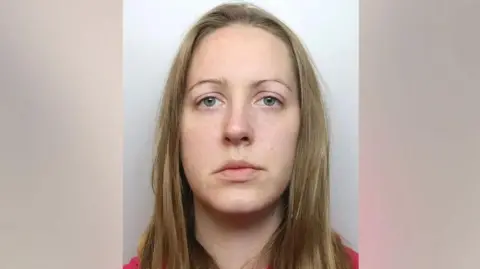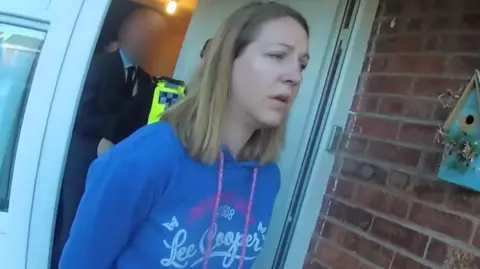Lucy Letby gave baby overdose two years before murders

 Cheshire Constabulary
Cheshire ConstabularyLucy Letby gave a baby 10 times the prescribed dose of morphine “in error” two years before her killing spree began, a public inquiry has heard.
The nurse was then unhappy at being told she could no longer administer controlled drugs at the Countess of Chester Hospital after the incident in July 2013.
The Thirlwall Inquiry, which is examining how she was able to kill and attack babies between June 2015 and June 2016, heard Letby received extra training after the incident.
Yvonne Farmer, who was practice development nurse at the time, told the inquiry at Liverpool Town Hall it was a “very serious error”.
The mistake was spotted quickly and the baby suffered no ill-effects, the inquiry heard.
Ms Farmer said Letby was not far into her nursing career at the time, but was outside the period of supervision required by the Nursing and Midwifery Council.
Part of the hospital’s response to the incident was to make Letby have extra training with Ms Farmer.
She said: “Lucy Letby was unhappy that she had to refrain from administering controlled drugs [for a period of time].”
When asked if it was normal for a nurse to be unhappy about not administering controlled drugs [in those circumstances], Ms Farmer replied: “Maybe not.”
She agreed when asked whether it was important to “recognise when you’ve made a mistake”.
 Cheshire Constabulary
Cheshire ConstabularyThe inquiry heard in another incident in April 2016, Letby gave antibiotics to a baby that had not been prescribed them.
In an internal document reflecting on what happened Letby wrote: “I feel this situation was unavoidable and care was given to the best of our ability.”
Nicholas de la Poer KC, counsel to the inquiry, asked Ms Farmer if that was an unavoidable error.
She replied: “No, if it’s not prescribed I don’t know why it was given.”
Mr de la Poer asked her if this “showed poor insight” by Letby, who replied “perhaps” it was.
Ms Farmer was also asked about a review of the Chester neonatal unit by the Royal College of Paediatrics and Child Health in September 2016, two months after Letby had been removed from clinical duties.
In a statement to the inquiry before her evidence, Ms Farmer said some of the questions by that review had left nurses “upset and tearful”.
When asked why this was, Ms Farmer said: “When Lucy Letby was removed we all felt under suspicion and if it wasn’t Lucy it could be one of us.
“We just didn’t know and I think we felt we hadn’t been supported by the senior managers at that time.
“We felt let down by a lack of communication. We were told we couldn’t speak to our colleagues about it.”
She added they did not get “any support from the doctors” and the situation left them feeling “very stressed and very emotional about it”.
Letby, of Hereford, was convicted of murdering seven babies and attempting to murder seven others, including one she tried to kill twice, and is serving 15 whole life prison sentences.
The inquiry continues.
‘Witch hunt’
The inquiry later heard how a manager apologised for saying in 2016 that she would be “delighted” to have Letby back on the ward after she had been suspended from nursing duties.
Yvonne Griffiths was deputy ward manager of the neonatal unit in 2015 and 2016.
Letby was removed from clinical duties in July 2016 after consultants expressed concerns that she was harming babies.
But she raised a grievance and in a meeting connected to that process Ms Griffiths said she would welcome Letby back on the ward.
Ms Griffiths also said consultants were “on a mission to remove Letby based on speculation” and described their approach as a “witch hunt”.
Richard Baker KC, who represents some of the families of the babies, asked Ms Griffiths if she was really saying that she would be happy to have someone back on the ward who might be a killer of babies.
She replied: “I know it doesn’t sound wonderful. I didn’t mean it as in delighted and in hindsight, I’m sorry.”
Questioned by Peter Skelton KC, who also represents some of the families of Letby’s victims, Ms Griffiths agreed that a nurse’s first duty is to her patients not her colleagues.
Mr Skelton said to Ms Griffiths: “You should have taken action personally to ensure the safety of patients on your unit.”
She replied: “I accept your conversation. Your critique.”










